![[Iran Revolutionary Guards]](../images/i/ir^agir.gif) image by Zoltan Horvath,
1 December 2014
image by Zoltan Horvath,
1 December 2014
Last modified: 2025-10-11 by ian macdonald
Keywords: iran revolutionary guards | pasdaran |
Links: FOTW homepage |
search |
disclaimer and copyright |
write us |
mirrors
![[Iran Revolutionary Guards]](../images/i/ir^agir.gif) image by Zoltan Horvath,
1 December 2014
image by Zoltan Horvath,
1 December 2014
See also:
An Iran "Pasdaran" (or Iran Revolutionary Guards) flag. It is the similar to
Iran Army (Basij) flag. The difference between these 2 flags is that the Basij
flag includes the wording of "NIROUYE MOGHAVEMATE BASIJ-E SEPAHE PASDARAN" at
the bottom of the Pasdaran emblem. That makes the flag special for the Basij as
the Basijis work under supervision of the Pasdaran.
William Garrison, 31 August 2006
The Pasdaran (Islamic Revolutionary Guards Corps) are a parallel military
outside the regular armed forces. The Basij is a paramilitary force
(militia-like) under the command of the Pasdaran. For more information see see
http://en.wikipedia.org/wiki/Islamic_Revolutionary_Guards_Corps.
M. Schmöger, 17 September 2006
The Army of the Guardians of the Islamic Revolution (Persian: سپاه پاسداران
انقلاب اسلامی / Sepāh-e Pāsdārān-e Enqelāb-e Eslāmi), often called
Revolutionary Guards, is a branch of Iran's military, founded after the Iranian
revolution on 5 May 1979. Whereas the regular military (artesh) defends Iran's
borders and maintains internal order, according to the Iranian constitution, the
Revolutionary Guard (pasdaran) is intended to protect the country's Islamic
system. The Revolutionary Guards state that their role in protecting the Islamic
system is preventing foreign interference as well as coups by the military or
"deviant movements". The Revolutionary Guards have roughly 125,000 military
personnel including ground, aerospace and naval forces. Its naval forces are now
the primary forces tasked with operational control of the Persian Gulf.
It flag is blue with yellow emblem. Image of flag:
http://www.digarban.com/sites/default/files/imagecache/internal_images_615maxwidth/images/5/139302101203438972643644.jpg
Zoltan Horvath, 1 December 2014
1357 year-conversion note: below the IRGC logo, the Arabic numerals on IRGC
flags are ۱۳٥۷ or 1357. As most Arab countries use the A.H. (Anno
Hegirae/Hijri/Haraj/Hijrah — 'Year of the Hajrah') calendar, 1357 AH is
equivalent to the Western 1938 AD/CE (Gregorian calendar). [A.D. = "Anno Domini"
which is Latin for "in the year of the Lord" or since the birth of Jesus; also
called the "Gregorian calendar". "C.E." means "Common Era" and is the same as
the Gregorian calendar.] However, Iran uses the "Solar Hijri" (S.H.) calendar --
therefore 1357 SH = 1979 AD/CE. [1979 was the year of the Jan.-Feb. 1979 Iranian
"Islamic Revolution" that overthrew the Pahlavi monarchy and replaced it with
the "velayat-e-fagih" or "rule of the jurisprudence" as espoused by Shia-Muslim
"Supreme Leader" Imam R.M. Khomeini, who returned from French exile to Tehran on
1 Feb. 1979.] The Hijrah ("migration") occurred in 622 CE, the year when the
Muslim prophet Muhammad and his followers migrated from Mecca to Medina, Arabia.
So, 1 S.H. started on March 18, 622 CE (the day of the Spring Equinox), while 1
A.H. started a couple of months later on July 16, 622 CE (the first day of the
Arab lunar month of Muḥarram). In the A.H. lunar-calendar there are 354 days
(with 355 days in a Leap Year), whereas the S.H. solar-calendar (Shamsi or
Khorshidi calendar) has about 10-11 more days or 365 days (with 366 days in a
Leap Year} -- which is equal to the Gregorian AD/CE 365/366 solar-calendar year.
It can be confusing in making a correct conversion between AH/AD dates in Iran,
because it used the AH lunar-calendar pre-1930 but soon thereafter switched to
the SH solar calendar. For the easiest date-conversion calculation, consult an
on-line AH/AD calendar-conversion calculator.
William Garrison, 6
December 2024
Ceremonial flag
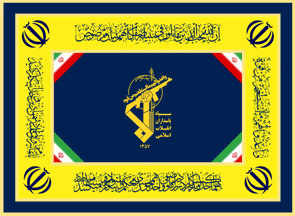 image located by William Garrison, 30
August 2019
image located by William Garrison, 30
August 2019
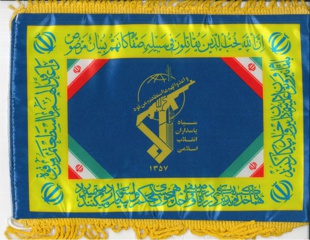 image located by
William Garrison,
12 September 2019
image located by
William Garrison,
12 September 2019
"Sepah-e Pasdaran-e Enqelab-e Eslami = "Islamic Revolutionary Guard Corps"
(IRGC)
William Garrison,
12 September 2019
Land Forces (Pasdaran) green-field ceremonial/derafsh flag
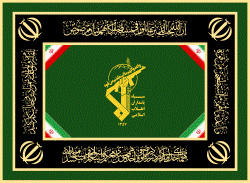 image located by William Garrison, 25 June 2025
image located by William Garrison, 25 June 2025
based on photo
Flag-use photo source: https://www.terrorism-info.org.il/app/uploads/2025/07/E_144_25.pdf
A green-field "ceremonial/derafsh" flag of the Pasdaran/IRGC; c. July 2025. Per
a Wikipedia article, the usually seen blue-field/yellow-border Pasdaran/IRGC
flag is the "official" flag, whereas this green-field/black-border flag is its
"ceremonial/derafsh" flag. I am unsure as to why the green color is used on this
flag. Are both the blue- and green-field varieties really needed? The color
"green" is frequently associated with "land" or "army" units, yet, as Iran is a
Muslim-religion oriented country, "green" is frequently used on many
Muslim-affiliated flags - as Muslims believe that green was the favorite color
of their prophet Muhammed. Iran has an unusual "two armies" military-system: the
"Pasdaran/IRGC" and the "artesh". The Pasdaran/IRGC has not only "land forces"
(i.e. "army"), but also its own Air Defense Forces, Aerospace Forces, and navy.
The blue-field/yellow-border flag refers to at least the "combined Pasdaran/IRGC
military" while the green/black-border flag may pertain just to the IRGC's
regular "ground forces/(army)". As the plain blue-field Pasdaran flag appears in
many photographs of Pasdaran navy speedboats attacking oil tankers throughout
the Persian Gulf, perhaps the Pasdaran "land force" was suffering from some
"identity crises" and wanted to differentiate itself with its own "army green"
flag here. [Besides the Pasdaran/IRGC, Iran also has another, larger military
system called the "artesh" (a robust, joint military system) is composed of not
only "ground/land forces" (i.e. "army"), but also of a navy, air-defense, and an
"Air Force" — each of which have their own separate FOTW listings. The main
differences between them are that the "artesh" is used for defense against
invaders, whereas the Pasdaran/IRGC is used for offensive uses in Levant
countries (and for suppressing internal political dissent.]
Regarding
this flag, the top slogan's text reads in Arabic (right-to-left): إِنَّ ٱللَّهَ
يُحِبُّ ٱلَّذِينَ يُقَـٰتِلُونَ فِى سَبِيلِهِۦ صَفًّۭا كَأَنَّهُم بُنْيَـٰنٌۭ
مَّرْصُوصٌۭ or, in English: "Surely Allah/God loves those who fight in His cause
in ˹solid˺ ranks as if they were one concrete structure" (Quran 61:4).
The right-side slogan in Arabic text, also the group's motto, says: وَأَعِدُّوا
لَهُمْ مَا اسْتَطَعْتُمْ مِنْ قُوَّةٍ or "Prepare against them what you
˹believers˺ can of ˹military˺ power" (Quran 8:60). "Them" being "non-Muslims"
and "believers" being "Muslims"; or in summary: "Muslims prepare your military
powers to use against non-Muslims" - which seems to be a relevant slogan for
this military flag.
The bottom slogan: is the same Quranic text as the
top slogan, but in Farsi/Persian: «همانا خداوند کسانی که در راه او در صفی واحد
همچون سدی محکم و استوار پیکار میکنند را دوست میدارد.» or “Indeed, Allah/God
loves those who fight in His cause, lined up together as if they were a solid
structure.” (Quran 61:4).
The left slogan is the same as the right
slogan, but in Farsi: «با تمام توان و نیرو علیه دشمنان دین و خدا پیکار کنید.» or
“Fight with all your strength and might against the enemies of religion and
Allah/God” (Quran 8:60). There is some slight differences in the interpretation
of Arabic words versus similar Farsi/Persian words.
A source informed me
that the Farsi inscriptions are written in the "Thuluth" script, which is quite
ornate and not easily readable. He also noted: "in the Iranian police flags, the
slogans are different and verses from other parts of the Qur'an are used. The
flags of Iran’s armed forces - including the Army/(Artesh), the Pasdaran/IRGC,
and the Police ("Law Enforcement/NAJA") - typically feature two Qur'anic verses
in Arabic, positioned at the top and right sections of the flag. The bottom and
left sections contain their Persian counterparts. A key detail is that since
these verses are taken directly from the Qur'an, they are not specific to either
Shia or Sunni beliefs, as the Qur'an is a shared foundation between both sects."
William Garrison, 25 June 2025
Plain flag
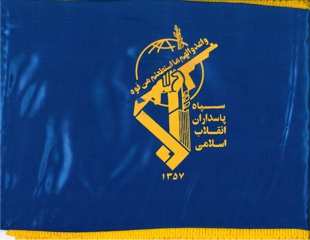 image located by
William Garrison,
12 September 2019
image located by
William Garrison,
12 September 2019
"Sepah-e Pasdaran-e Enqelab-e Eslami = "Islamic Revolutionary Guard Corps"
(IRGC)
William Garrison,
12 September 2019
Infantry Brigade of Nineveh
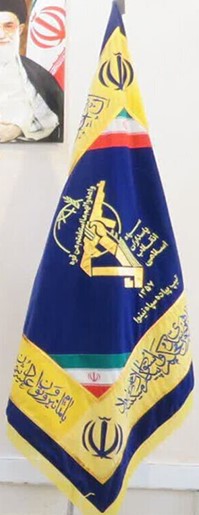
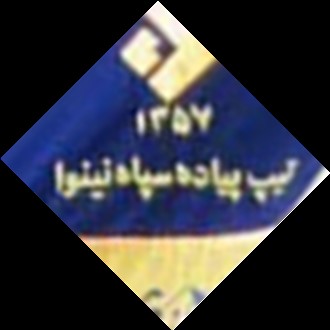 images located by
William Garrison,
8 November 2024
images located by
William Garrison,
8 November 2024
Source:
https://www.tehrantimes.com
While similar to the original IRGC derafsh (ceremonial) flag, in this flag variant, below the usual IRGC logo there is an additional phrase that identifies this flag as for the "Infantry Brigade of Nineveh" Sepah-e, (Persian: تیپ پیاده نینوا ). [Persian: Nineveh/Neynava; Arabic: Neynwa]. "Sepah-e Neynava" is a large-sized military unit (this "corps" is smaller than an "army"), of which this Infantry Brigade is part. This Sepah-e (corps) is currently based in Golestan Province in northern Iran along the Turkmenistan border.
This flag was observed in a "Tehran Times" online article revealing the death of
this brigade's commander in a gyroplane/gyrocopter accident on 4 Nov. 2024.
According to my Tehran source, each provincial Sepah-e military unit (of which
there were at least 30 in 2024) may create its own derafsh, and, apparently,
each military sub-unit (such as this infantry brigade) may create its own, too,
based upon the whim of a unit commander. Not all Sepah-e commands are named
after the province that they are located in. Here, "Nineveh" is an old Persian
alternative name for "Karbala" (Iraq), where in 680 CE the Shia Imam Hussein was
killed in battle. There is a "Nineveh Governorate" (province) in northern Iraq,
but it is 636 km northwest of Karbala. In Jonah 2-10, The Bible, the Lord
directs Jonah to travel to Nineveh (perhaps nearer Mosul than Karbala) to preach
a message of repentance against their sinful ways; he was delayed after being
temporarily swallowed by a whale before reaching Nineveh! This high-seas,
action-packed journey is also mentioned in the tenth chapter, "Yunus" (Arabic
for "Jonah"), of the Muslim holy book: the Quran. [In similar fashion, the
"Sepah-e Quds" or "Quds Force" (Jerusalem) — an Iranian military unit that
operates outside of Iran (such as in the Levant) -- has its own flag as shown in
FOTW.]
William Garrison,
8 November 2024
Command of the General Provost & Military Police
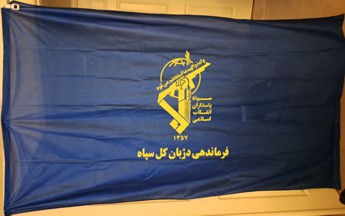 image located by William Garrison, 14 October 2023
image located by William Garrison, 14 October 2023
A blue-field flag of the Iran "Command of the General Provost & Military Police"
(English translation of the Farsi slogan at the bottom line), a subdivision of
the "Joint Staff of the Iran Revolutionary Guards Corps" (IRGC); c. 2021.
William Garrison, 14 October 2023
IRGC Navy
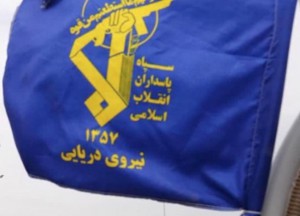 image located by William Garrison, 11 February 2024
image located by William Garrison, 11 February 2024
The flag of the IRGC (Pasdaran) Navy. This blue-field flag has the standard
yellow IRGC logo/emblem and beneath it the Farsi slogan (reading right-to-left):
"niru-ye darayi-e" which in English means "navy". The full official name is:
نیروی دریایی سپاه پاسداران انقلاب اسلامی
or in English: "Navy of the Islamic
Revolutionary Guard Corps"; c. 2023. [Remember, Iran has 2 navies: the "IRGC
Navy" and the larger "Artesh Navy" – both have their own distinctively different
flags.]
William Garrison, 11 February 2024
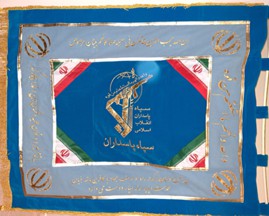 image located by Bill
Garrison, 27 June 2024
image located by Bill
Garrison, 27 June 2024
Source: https://www.presstv.ir/Detail/2023/02/07/697751/Iran-defense-products-many-clients-Top-general
A "derafsh" or "ceremonial" flag tentatively titled as the "IRGC Jihad derafsh"; c. Fall 2023. The middle logo is that of the "Islamic Revolutionary Guard Corps" (IRGC) = [Sepah-e Pasdaran-e Enqelab-e Eslami} or "Pasdaran", which can be seen immediately to the right of the logo. Usually, immediately below the logo is the year of the Iranian Revolution: 1979, but in Arabic numbers; however, that date is missing here. Instead, there is the shortened title: "Sepah-e Pasdaran-e" or "The Revolutionary Guards". In the top gray/grey area is a Farsi slogan, translated into English, as: "Allah loves those who kill them [disbelievers] for the sake of peace." On the right side there is the Farsi slogan: "Alhamdulillah" or "Praise be to Allah" or "Thank God". Inside the bottom gray area are two lines of slogans. The top-bottom slogan reads: "Allah will recognize believers as martyrs who die in the line of jihad against unbelievers." The second bottom line reads: "He (Allah) likes them [jihad martyrs] very much." The slogan on the left side reads: "May Allah work against the unbelievers". At the right hoist-side are five tabs through which a flag-pole can be inserted.
The "IRGC Jihad" flag (blue) displayed at the Imam Khomeini holy shrine and
mausoleum that is located in southern Tehran in the Beheshte-Zahra ("Paradise of
Zahra") cemetery, on Feb. 7, 2023. Photo credit: Tasnim news agency.
Bill
Garrison, 27 June 2024
Armored Units
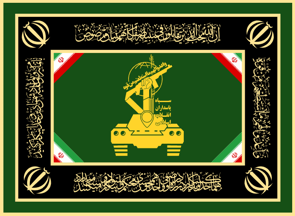 image located by William Garrison, 1 October 2020
image located by William Garrison, 1 October 2020
This flag for the "Armored units" of the Islamic Revolutionary Guard Corps
(IRGC) is similar to the main, blue IRGC flag, but this has an obvious
"tank" design incorporated into the IRGC logo upon a green background. The
IRGC military system (offensive) while similar is separate from the ARTESH
military system (defensive).
William Garrison, 1 October 2020
![[Iran Revolutionary Guards]](../images/i/ir^pasdr.gif) image by Eugene Ipavec, 6
March 2009
image by Eugene Ipavec, 6
March 2009
based on photo
This flag welcomes the return of the Shia Muslim's "Hidden Imam", the Mahdi.
IRAN Pasdaran Basij Islam Shia Military YA MAHDI Flag.
Based on:
http://cgi.ebay.com/ws/eBayISAPI.dll?ViewItem&item=180325092504&ssPageName=ADME:B:EF:US:1123
William Garrison, 22 February 2009
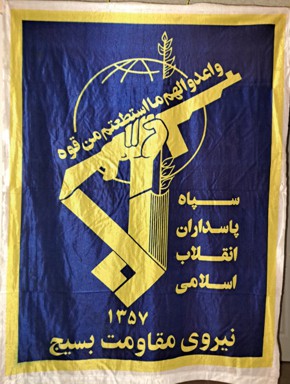 image by
William Garrison, 27 February 2024
image by
William Garrison, 27 February 2024
A 4'x6' vertical version of the normal "Basij" flag but with a yellow border or frame around the IRGC logo. Beneath the Pasdaran/IRGC logo, the bottom line reads in Farsi (right-to-left): “Niru-ye Moghāvemat-e Basij” (Persian: نیروی مقاومت بسیج, "Resistance Mobilization Force"). While not shown on this flag, its full name is: “Sâzmân-e Basij-e Mostaz'afin” (سازمان بسیج مستضعفین, "The Organization for Mobilization of the Oppressed"). Basij (بسيج) = "The Mobilization".
William Garrison, 15 October 2024
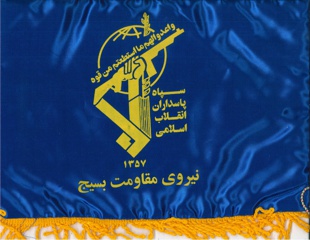 image by
William Garrison,
13
September 2019
image by
William Garrison,
13
September 2019
Beneath the Pasdaran/IRGC logo, the bottom line reads in Farsi (right-to-left): “Niru-ye Moghāvemat-e Basij” (Persian: نیروی مقاومت بسیج, "Resistance Mobilization Force"). While not shown on this flag, its full name is: “Sâzmân-e Basij-e Mostaz'afin” (سازمان بسیج مستضعفین, "The Organization for Mobilization of the Oppressed"). Basij (بسيج) = "The Mobilization".
William Garrison 15 Oct. 2024
![[Iran Revolutionary Guards]](../images/i/ir^pasn.jpg) image located by William Garrison, 22 February 2009
image located by William Garrison, 22 February 2009
IRAN Pasdaran Basij Islam Shia Military YA MAHDI Flag
Source:
http://cgi.ebay.com/ws/eBayISAPI.dll?ViewItem&item=180325095103&ssPageName=ADME:B:EF:US:1123
William Garrison, 22 February 2009
![[Iran Revolutionary Guards]](../images/i/ir^revgd.gif) image located by William Garrison, 20 December 2016
image located by William Garrison, 20 December 2016
On
http://www.basij.ir/parameters/basij/modules/cdk/upload/content/news/13476/sazanegi.jpg
(archived here) is a picture of a blue
flag with the logo shown here, as the flag of the Iranian Basij Sazandegi.
William Garrison, 20 December 2016
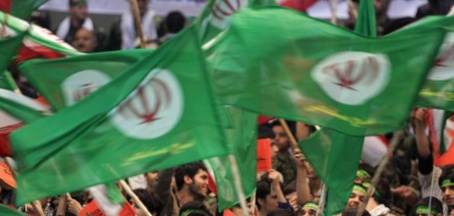 image located by William Garrison, 28 September 2019
image located by William Garrison, 28 September 2019
ca. Nov. 26, 2009 street demonstration in Tehran celebrating 30th Anniversary
the founding of the Basij militia. [From 1979 Iran revolution overthrowing
Shah.] Flag contains red, stylized "Allah" inside white circle on green flag.
Sadly, cannot read yellow slogan on flag.
source:
https://www.upi.com/Top_News/Special/2009/11/30/Dissidents-infiltrated-Basij-Iran-claims/21741259597144/
William Garrison, 28 September 2019
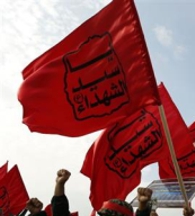 image located by William Garrison, 5 October 2019
image located by William Garrison, 5 October 2019
Flag, Iran, Basij militia, unknown use c. 2015
source:
https://www.presstv.com/Detail/2015/11/20/438441/Iran-IRGC-Jafari-Paris-drill-Qom-Basij
Caption; Iran's volunteer forces, Basij, are holding the second day of
major military drills on November 20, 2015 on the outskirts of the central
city of Qom. ©IRNA
William Garrison, 5 October 2019
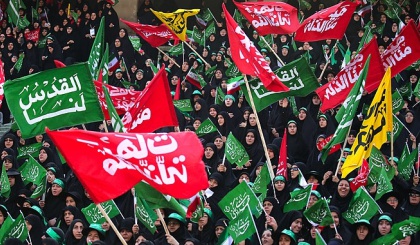 image located by William Garrison, 28 September 2019
image located by William Garrison, 28 September 2019
Great Conference of Basij members at
https://en.wikipedia.org/wiki/Azadi_stadium (Tehran, Iran), 4 October 2018,
carrying green, red, & yellow flags. The green flag pertains to "Al Quds" (iJerusalem).
source:
https://commons.wikimedia.org/wiki/File:Iranian_Women_at_the_Great_Conference_of_Basij_members_at_Azadi_stadium_October_2018_03.jpg
William Garrison, 28 September 2019
Rival to Israel" flag
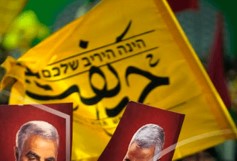 image located by William Garrison, 18 June 2025
image located by William Garrison, 18 June 2025
Source:
https://www.reddit.com/r/flags
A yellow-field flag purportedly used by
the Iran Basij militia; c. April 2024 in Theran, Iran. The top slogan is in
Hebrew and appears to read: "This is your rival" - it could be interpreted as
being a threat by Israel to Iranians, essentially meaning "We Israelis are a
threat to you". A faint English slogan at the bottom may read: "You're dealing
with us!" - it could be interpreted as meaning that the U.S. is threatening
Iran, too. The middle Farsi slogan roughly reads: "Rival to Israel's core" - a
rather clear blustering comment that the Basij is threatening the existence of
Israel. So why are all three languages on this flag? It may be that the Basij
wants to remind Iranians that they are under constant threat from the "Big
Satan" (Sheytân-e Bozorg) - the U.S., and the "Little Satan" (Shaytân-e Kuchak)
- Israel. [Thanks to Martin Kramer for mentioning this concept to me.] So, all
three different languages bring together an "artistic" collage of
Hebrew-Farsi-English threat imagery - without the need for explicitly using the
names of Israel and the U.S.; the different languages achieve that indirectly.
[For clarification, the two portraits are not part of this flag, they are on red
placards being carried in front of the flag.]
For the history of this
"Satan" linkage, see:
https://en.wikipedia.org.
William Garrison, 22 September 2024
Translations of the LARGE MIDDLE Farsi-script slogan may be interpreted as:
The phrase "من حریفتم" in the context of a challenge flag—especially one
directed as a bold statement against Israel—can be translated in several
powerful ways depending on the tone you're aiming for.
A direct
translation with a confident tone would be:
"I am your match."
If you
want something more aggressive or confrontational:
"I am your challenger."
Or something a bit more literary and elevated:
"I stand as your rival."
If you're going for a more epic or slogan-like tone, something you'd see on
a banner or rally cry, you could use:
"Your rival stands before you." or
"Face me — your equal, your rival."
The bottom small-script Farsi
sentence, a powerful and bold translation of "عاشق مبارزه با اسرائیل هستم" for
use on this flag could be:
"I love fighting Israel."
If you'd like a
more poetic or dramatic version that still carries strength and clarity, you
could say:
"I live to fight Israel." or "My passion is the fight against
Israel."
And for a more intense, rally-style tone:
"Fighting Israel is
my calling."
Overall, definitely a flag shouting: "Hey, Israel: We're In
Your Face!" [A hidden flagpole sleeve is at the right hoist side — but is
missing in this slightly cropped image.]
William Garrison, 14 May
2025
Initially I thought that the English slogan at the bottom read: "You're
dealing with us!" - it could be interpreted as meaning that the U.S. is
threatening Iran, too. However, I now believe that it was a phrase written from
the perspective of an Iranian (Basij soldier) as a warning to Israel, but then,
why write it in English rather than just use Farsi as in the other two Farsi
writings? Or just write it in Hebrew so that the Israelis would clearly get the
message? Or maybe this English phrase is meant to be a warning to the U.S.A.?
Whatever its meanings, I don't think that I would want to be spotted parading
this flag around Tehran anytime this week as Israeli spotter drones are flying
overhead.
William Garrison, 18 June 2025
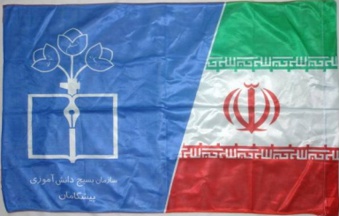
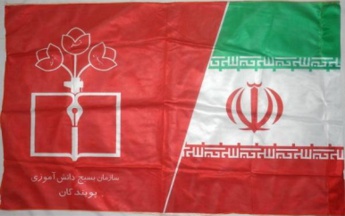 images located by William Garrison, 30 September 2019
images located by William Garrison, 30 September 2019
Flag, Iran, Basij school militia-training, 2 varieties: blue/Pishgaman & red/Puyandegan
In the mid-1990s the Iranian government began militia training for middle
and high-school students. These students were being trained to serve after high
school in the national Basij militia (which supervised the student's training).
The middle-school students (12-14 year olds) served in the "Dynamic Resistance"
(Pooyandegan" or "Puyandegan") units with the red flag ("Puyandegan" is on the
bottom line). The high-school students (15-18 year olds) served in the "Pioneer
Resistance" ("Pishgaman") units with the blue flag ("Pishgaman" is on the bottom
line). Collectively, these students served in the "Scouts Forces" of the Basij.
On the left-side of both flags is a logo with an ink-pen atop a book, with
tulips symbolizing the martyrs of Iran.
William Garrison, 30 September
2019
 image
located by
William Garrison, 24 December 2024
image
located by
William Garrison, 24 December 2024
A horizontal flag of the Iranian "Basij (Student) Mobilization" (Persian:
بسیج دانشجویی) [English pronunciation reading right-to-left: "besij
daneshjuyi"]; it was founded in Nov. 1988 with the scope of promoting the
theocratic principles of the Iranian revolution (Jan.-Feb. 1979 = "rule of the
jurisprudence") and Shia Islam.
William Garrison, 24 December 2024
The "Basij" militia of Iran are comprised of both high-school and college
students. Here is a photo of a yellow variety of their "Basij" school flag; c. 1 Dec. 2023.
Source:
https://www.memri.org
William Garrison, 8 December 2023
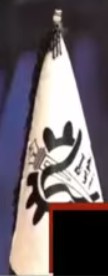 image by
William Garrison,
3 June 2023
image by
William Garrison,
3 June 2023
Source:
https://www.memri.org/reports/irgc-aerospace-force-commander-general-amir-ali-hajizadeh-america-behind-all-wars-region
The white-field flag of the "Basij Students' Office" at the Iranian
"University of Science and Technology" (which has multiple campuses); c. May
2023.
William Garrison, 3 June 2023
.gif) image by
William Garrison,
3 June 2023
image by
William Garrison,
3 June 2023
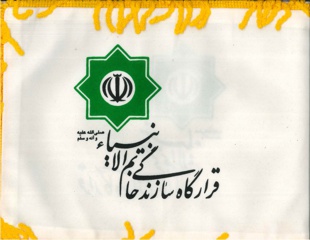 image by
William Garrison,
14
September 2019
image by
William Garrison,
14
September 2019
"Qarargah-e Sazandagiye Khatam al-Anbiya" = "Khatam al-Anbiya Construction
Headquarters" [IRGC sub-unit]
William Garrison,
14
September 2019
Simply known as "Khatam", is an engineering firm controlled by the Islamic
Revolutionary Guard Corps (IRGC). The firm, also known as
"gharargah-e-sazandegi-e-khatamul-anbia (Khatam al-Anbiya Reconstruction
Headquarter), GHORB", is one of the country's largest contractors in industrial
and development projects. It was established on February 11, 1979 (although
other sources mention December 13, 1989). It was intended originally to provide
military engineering projects and after the 1980-1988 war, it was oriented
towards providing public utilities and in charge of rebuilding the country,
diversifying over the years into companies dealing with mechanical engineering,
energy, mining and defense.
Sources:
https://www.khatam.com/fa/aboutus
http://www.khatam.com/english/moghadameh_english.asp
https://www.iranwatch.org/iranian-entities
https://fa.wikipedia.org
https://en.wikipedia.org/wiki/Khatam-al_Anbiya_Construction_Headquarters
For additional information go to Khatam (official website):
http://khatam.com/
Esteban Rivera, 15 September 2025
Logo
.jpg) image located by
Esteban Rivera, 15 September 2025
image located by
Esteban Rivera, 15 September 2025
Source: https://www.khatam.com
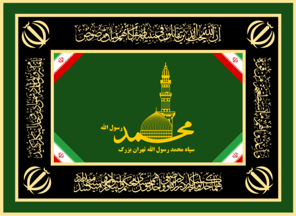 image located by William Garrison, 9 October 2020
image located by William Garrison, 9 October 2020
Source:
https://commons.wikimedia.org/wiki/File:Flag_of_Muhammad_Rasul_Allah_Corps_of_IRGC
William Garrison, 1 October 2020
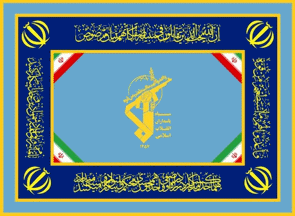 image located by Esteban Rivera, 27 November 2023
image located by Esteban Rivera, 27 November 2023
based on photo
Source:
https://en.wikipedia.org/
The Islamic Revolutionary Guard Corps Aerospace Force or Islamic Revolutionary
Guard Corps Air and Space Force, NEHSA, is the strategic missile, air, and space
force within the Islamic Revolutionary Guard Corps (IRGC) of Iran. It was
renamed from the IRGC Air Force into the IRGC Aerospace Force in 2009."
Sources:
https://en.wikipedia.org/wiki/Islamic_Revolutionary_Guard_Corps_Aerospace_Force
Flag with blue outer stripe
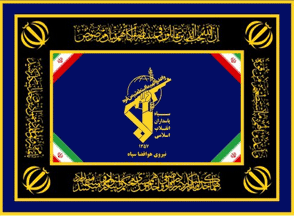 image located by Esteban Rivera, 27 November 2023
image located by Esteban Rivera, 27 November 2023
based on photo
and photo
Source:
https://en.wikipedia.org/
Regarding this dark-blue field flag, the slogan beneath the center IRGC logo
reads in Farsi: "niru-ye havâfazây-e" or in English as: "Aerospace Force". This
is the IRGC unit that controlled the launching of various armed drones from Iran
towards Israel starting on 13 April 2024. The light-blue field flag is normally
associated with the "Aerospace Force".
William Garrison, 14 April 2024,
4 February 2025
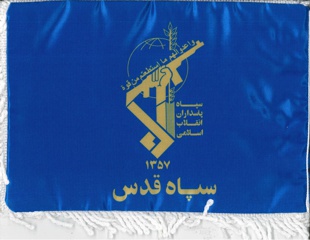 image by
William Garrison,
14
September 2019
image by
William Garrison,
14
September 2019
"Sepah-e Quds" = "The Quds Force" [a sub-unit of the IRGC].
"Sepah-e Quds"
in the bottom line of this gold-blue flag.
William Garrison,
14
September 2019
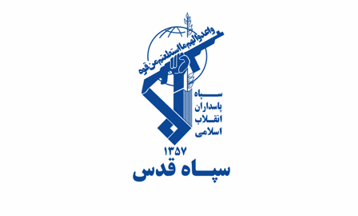 image by Pete Loeser, 25 May 2022
image by Pete Loeser, 25 May 2022
based on photo
located by William Garrison,
14
September 2019
The Quds Force (نیروی قدس), is a branch of Iran's Islamic Revolutionary Guard
Corps (IRGC). It is considered the elite clandestine wing of the Guard and
specialize in unconventional warfare and military intelligence operations
primarily in foreign countries. It is sometimes referred to as the Qods Force,
or Jerusalem Force. It was organized shortly after the Iranian Revolution
(1978-79), and its activities have centered around organizing, supporting, and
sometimes leading local forces abroad.
It has been active throughout many
countries in the Middle East, including Hezbollah, Hamas, the Palestinian
Islamic Jihad, Yemeni Houthis, and Shia militias in Iraq, Syria, and
Afghanistan.
Reportedly the Quds Force reports directly to the Supreme Leader
of Iran, Ayatollah Khamenei. The U.S. Secretary of State designated the Islamic
Revolutionary Guard Corps and Quds Force as a Foreign Terrorist Organizations
(FTO) in 2019 based on their “...continued support to and engagement in
terrorist activity around the world.”
Pete Loeser, 25 May 2022
See also: Al-Quds Brigade (Syria)
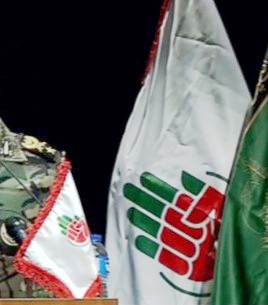 image located by William Garrison, 1 May 2025
image located by William Garrison, 1 May 2025
Source:
https://www.memri.org
The flag of the Iran "Mujahideen Abroad"
organization. "Mujahideen" (Arabic: مُجَاهِدِين, romanized: mujāhidīn) is the
plural of "mujahid", an Arabic term that refers to "someone who struggles or
strives", often in the context of "jihad" (struggle/strive) particularly in the
context of Islam. The term is commonly used to refer to guerrilla fighters or
"holy warriors", especially in the Middle East. Such "strivers" could be either
a Sunni or Shia/Shiite Muslim, but in this flag's context, it refers to Iran
Shiites who live or serve as militants outside of Iran, which has a theocratic
government run by Shia clergy. In its logo there is one hand, but shown in two
different positions: the green "full open" hand with the red "clinched" fist.
The green open-hand symbolizing "Hi" or "peace", with the red clinched-fist
representing the international "resistance" meaning, with the red symbolizing
the blood spilled by Shiite martyrs. Sort of a: "Come to (Shia) Islam ... or
else" representation. This organization is promoted, if not controlled, by the
Iran "Islamic Revolutionary Guard Corps" (IRGC).
William Garrison, 1
May 2025
Logo
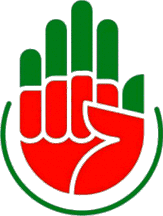 image located by William Garrison, 1 May 2025
image located by William Garrison, 1 May 2025
Source: https://www.mojahedandarghorbat.ir/14010614-2/
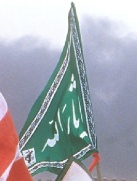 image located by William Garrison, 14 November 2019
image located by William Garrison, 14 November 2019
This green flag has a Pasdaran militia patch logo.
source:
https://www.gettyimages.ca/detail/news-photo/victorious-iranian-revolutionary-guards-burn-a-us-flag-in-news-photo/103232305?adppopup=true
Caption: "Iranians Capture Al-Fao. Victorious Iranian Revolutionary
Guards burn a US flag in Al-Fao Peninsula, Iraq, 15th February 1986. Smoke rises
over the Iraqi oil installations burning behind. The Iranians launched a
surprise attack against the Iraqi troops defending al-Fao. The Iraqi units in
charge of the defences consisted mostly of poorly-trained Iraqi Popular Army
conscripts who collapsed when they were suddenly attacked by the Iranian
Pasdaran (Revolutionary Guard) forces. (Photo by Kaveh Kazemi/Getty Images)" c.
Feb. 1986
Of particular interest is that in the bottom-left corner side
of middle green flag it has an Iranian Pasdaran militia logo. I believe it was
printed on the flag when the flag was originally made, as the Pasdaran-logo
image is in black-and-white which matches the overall white-black border frame
on the flag. Also, I have never seen a black-white Pasdaran patch by itself.
William Garrison, 14 November 2019